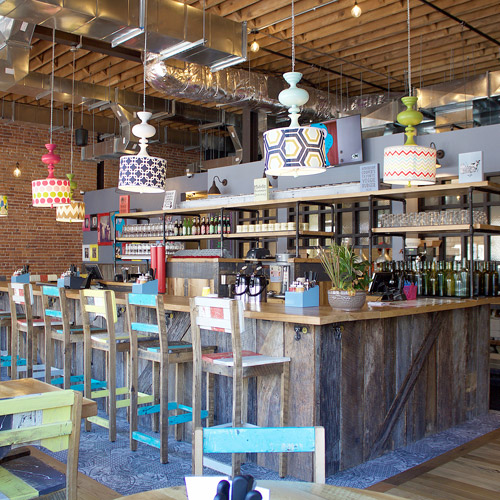As the nation’s leading retailer of automotive replacement parts, AutoZone is revving its engines. The Memphis, Tennessee-based company opened its first store in 1979, and today has more than 5,800 locations in the United States, Mexico, and Brazil. Each year, AutoZone opens roughly 150 new stores in the United States alone.
Tim Goddard understands how AutoZone achieved such an impressive track record. In addition to serving as the company’s vice president, store development, customer satisfaction, the automotive-aftermarket industry veteran has been running stores for the past three decades. In his current role, Goddard leads a team responsible for site research, real estate leases and purchases, permitting, and store construction. He says AutoZone succeeds thanks to two core commitments: a focus on customer service, and a dedication to “AutoZoners” (employees) and local communities.
Goddard recalls how an early interaction with Bill Rhodes, chairman, president, and CEO, customer satisfaction, showed him how important customer service is to company leaders.
“I visited one of our stores in my first year and saw our CEO out in the parking lot helping a customer with his air conditioning,” Goddard recalls. “A commitment to customer service is more than a corporate catchphrase at AutoZone. Our leaders live it on a daily basis.”
That customer-service culture trickles down to every department, including Goddard’s store development team. “If you’re not helping a customer, you should be helping and supporting someone who is,” Goddard says. For him to be successful, he has to know what each “AutoZoner” in the field needs to thrive. His department finds visible locations, works with legal on required contracts, handles permitting with local authorities, collaborates with general contractors to build stores, and then hands off a location to the operations team.
Throughout the process, Goddard works with various counterparts, keeping AutoZoners in mind every step of the way.
“If everyone isn’t involved and aware from day one, you create delays,” he says. “Delays are unacceptable because our customers come in every day for auto parts. If we’re not helping them, we’re not doing our job.”
By promoting collaboration, communication, and accountability, Goddard also ensures each person on his team understands the benefits of taking a team approach and knows exactly what their role is from site identification to grand opening.
Building Relationships in the Communities
When AutoZone’s founder, J.R. “Pitt” Hyde III, opened the first AutoZone store in 1979, he did so with a devotion to philanthropy, which remains a hallmark of the company today.
Many of AutoZone’s charitable efforts are centered in the city of Memphis, home to AutoZone’s store support center. This deep commitment to the greater Memphis community combines civic leadership, AutoZoner engagement, and funding to advance social services, K-12 education, economic development, and arts and culture in the region.
AutoZone matches employee contributions to approved nonprofits, and leaders are encouraged to volunteer with local groups. Tim Goddard is also on the Salvation Army’s Memphis advisory board.
Goddard says that he refuses to micromanage and instead hires great people. Having spent nearly one year in AutoZone’s HR department, he knows how to give employees the resources and trust to carry out their jobs.
“If you trust good people, they thrive, and that just drives the customer experience forward,” he says.
The store development team is a microcosm of how the entire organization operates. Goddard—like his peers in other departments—asks those on his team to share ideas, make decisions quickly, and do the best activity for the customer to make their experience quick, easy, and friendly. The company has developed a reputation as a great place to work, and retention is high. Employees with interests in other departments are encouraged to explore growth opportunities and learn new skills.
AutoZone’s customer-focused approach is complemented by the company’s dedication to local communities. When Goddard’s team researches a new location, they engage local authorities and stakeholders to uncover and understand how AutoZone can fit in and meet a community’s needs.
“We want our stores to be embraced, and we want to understand what people are looking for from us,” Goddard says.
The construction of an AutoZone store in Franklin, Tennessee, clearly demonstrated the benefits of this approach. Goddard’s team identified an ideal spot in an historic district, and they worked closely with the City of Franklin to meet strict building requirements. AutoZoners in pre-construction, legal, and real estate teams met regularly with city departments and historic societies to determine and understand requirements. Then, they complied with associated design standards to create and build an AutoZone that fits into an existing city fabric and pays tribute to the history of Franklin.
During the process, store-development employees had the chance to stretch their normal duties and work together to find creative ways to meet the needs of the community. Several team members were in direct conversations and negotiations with stakeholders, able to adjust AutoZone’s typical plans to meet Franklin’s expectations. AutoZone increased its building footprint to accommodate required minimum square footage, provided an additional entry point for a pedestrian entrance, incorporated various building façade elements and materials, installed historic storyboards, and met extensive landscaping requirements. This accumulated effort resulted in building one of the most unique AutoZone locations to date.
Another AutoZone store in Sanford, North Carolina, suffered major structural damage due to a fire. This required the store to be completely demolished and rebuilt.
“We want our customers to have a place to buy parts, and we want our AutoZoners to work without any gaps in their pay,” Goddard says. “If a store experiences a problem, we need to be smart and responsive to address all issues with speed and safety in mind.”
The team faced huge challenges, but was committed to minimizing the repercussions to the community and AutoZoners alike. The morning after the fire, AutoZone leaders met in person with the City of Sanford to devise a plan that would get them through all required municipal approvals without delay. Within two weeks, they had addressed all comments and concerns from the city and obtained a building permit for the construction of an identical store. Store operators and others quickly mobilized and relocated AutoZoners to other locations to avoid lapses in work schedules and compensation. Permitting and building a new location can take between six and 12 months; the store development team worked closely with a general contractor and finished the total rebuild in fewer than 45 days.
Both incidents illustrate AutoZone’s customer service culture in action.
“No matter if you are in the stores, a distribution center, or an office, you have a customer,” Goddard stresses. “We can never lose sight of that no matter what we are responsible for on any given day.”
As Goddard leads the store development team, he works to ensure each facility is completed successfully, providing a high-quality and consistent shopping experience at every location.
Going Green
While AutoZone continues to grow both domestically and internationally, its responsibility to the environment grows right along with it. This includes everything from recycling at stores and distribution centers to reducing emissions with its transportation fleet.
AutoZone Stores collected more than 9.5 million gallons of used oil for recycling in 2016
Distribution Centers and Truck Facilities recycle more than
- 18,000 tons of cardboard per year
- 800,000 wood pallets each year
- 900 tons of shrink-wrap each year


